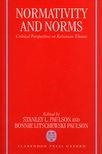 Normativity and Norms: Critical Perspectives on Kelsenian Themes
Normativity and Norms: Critical Perspectives on Kelsenian Themes
Published online:
22 March 2012
Published in print:
11 February 1999
Online ISBN:
9780191695209
Print ISBN:
9780198763154
Contents
-
-
-
-
-
-
-
-
-
-
-
-
-
-
I. Legal Powers I. Legal Powers
-
1. The Relation between the Act and its Legal Consequences. 1. The Relation between the Act and its Legal Consequences.
-
2. The Power-Exercising Act. 2. The Power-Exercising Act.
-
3. The Nature of the Legal Consequences. 3. The Nature of the Legal Consequences.
-
4. Powers and Rights. 4. Powers and Rights.
-
-
II. Legal Powees and Legal Norms II. Legal Powees and Legal Norms
-
III. Power-Conferring Laws III. Power-Conferring Laws
-
IV. Noemative Powers IV. Noemative Powers
-
V. Normative Powers and Voluntary Obligations V. Normative Powers and Voluntary Obligations
-
VI. Normative Powers and Promises VI. Normative Powers and Promises
-
-
-
-
-
-
-
-
-
Chapter
24 Voluntary Obligations and Normative Powers
Get access
Pages
450–470
-
Published:February 1999
Cite
Raz, Joseph, 'Voluntary Obligations and Normative Powers', in Stanley L. Paulson (ed.), Normativity and Norms: Critical Perspectives on Kelsenian Themes (Oxford , 1999; online edn, Oxford Academic, 22 Mar. 2012), https://doi.org/10.1093/acprof:oso/9780198763154.003.0024, accessed 8 May 2025.
Abstract
This chapter argues that a satisfactory analysis of voluntary obligations must be conducted in terms of normative powers. To substantiate this claim, it examines in some detail the concepts of a normative power and of a power-conferring norm (or P-norm). It begins with an analysis of legal powers and then proceeds to examine the applicability of the concept outside the law.
Collection:
Oxford Scholarship Online
You do not currently have access to this chapter.
Sign in
Personal account
- Sign in with email/username & password
- Get email alerts
- Save searches
- Purchase content
- Activate your purchase/trial code
- Add your ORCID iD
Purchase
Our books are available by subscription or purchase to libraries and institutions.
Purchasing informationMetrics
View Metrics
Metrics
Total Views
130
88
Pageviews
42
PDF Downloads
Since 10/1/2022
| Month: | Total Views: |
|---|---|
| October 2022 | 1 |
| December 2022 | 2 |
| January 2023 | 7 |
| February 2023 | 3 |
| March 2023 | 14 |
| April 2023 | 5 |
| May 2023 | 4 |
| June 2023 | 4 |
| July 2023 | 2 |
| August 2023 | 3 |
| September 2023 | 6 |
| October 2023 | 4 |
| November 2023 | 3 |
| December 2023 | 2 |
| January 2024 | 5 |
| February 2024 | 4 |
| March 2024 | 5 |
| April 2024 | 13 |
| May 2024 | 1 |
| June 2024 | 3 |
| July 2024 | 3 |
| August 2024 | 2 |
| September 2024 | 4 |
| November 2024 | 4 |
| December 2024 | 1 |
| January 2025 | 3 |
| February 2025 | 7 |
| March 2025 | 5 |
| April 2025 | 10 |
Citations
Altmetrics

Get help with access
Institutional access
Access to content on Oxford Academic is often provided through institutional subscriptions and purchases. If you are a member of an institution with an active account, you may be able to access content in one of the following ways:
IP based access
Typically, access is provided across an institutional network to a range of IP addresses. This authentication occurs automatically, and it is not possible to sign out of an IP authenticated account.
Sign in through your institution
Choose this option to get remote access when outside your institution. Shibboleth/Open Athens technology is used to provide single sign-on between your institution’s website and Oxford Academic.
If your institution is not listed or you cannot sign in to your institution’s website, please contact your librarian or administrator.
Sign in with a library card
Enter your library card number to sign in. If you cannot sign in, please contact your librarian.
Society Members
Society member access to a journal is achieved in one of the following ways:
Sign in through society site
Many societies offer single sign-on between the society website and Oxford Academic. If you see ‘Sign in through society site’ in the sign in pane within a journal:
If you do not have a society account or have forgotten your username or password, please contact your society.
Sign in using a personal account
Some societies use Oxford Academic personal accounts to provide access to their members. See below.
Personal account
A personal account can be used to get email alerts, save searches, purchase content, and activate subscriptions.
Some societies use Oxford Academic personal accounts to provide access to their members.
Viewing your signed in accounts
Click the account icon in the top right to:
Signed in but can't access content
Oxford Academic is home to a wide variety of products. The institutional subscription may not cover the content that you are trying to access. If you believe you should have access to that content, please contact your librarian.
Institutional account management
For librarians and administrators, your personal account also provides access to institutional account management. Here you will find options to view and activate subscriptions, manage institutional settings and access options, access usage statistics, and more.